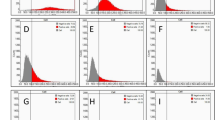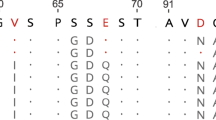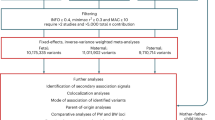Abstract
AT LEAST three gene loci seem to be involved in determining the various forms of human alkaline phosphatase (ALP)—one coding for the placental form of the enzyme, at least one coding for the intestinal forms, and at least one for the liver, bone and kidney forms1,2. These three classes of human alkaline phosphatase can be distinguished from one another by their behaviour with certain inhibitors, their thermostabilities and their electrophoretic and immunological characteristics. Recent studies have shown that in the dog, the ALP present in placenta closely resembles that in liver, and that these enzymes are very similar to the ALP present in human liver but different from the ALP present in human placenta3,4. It has also been reported that human placental ALP differs from other mammalian placental ALPs in certain respects (for example, sensitivity to L-phenyl-alanine inhibition)5,6. In view of these results we have examined some of the characteristics known to distinguish human placental and human liver ALPs, in the liver and placental ALPs from a series of mammalian species. The species from which both tissues were obtained included rodents, carnivores, ungulates and one primate (rhesus). We report here that the properties of human placental ALP differ from those of human liver ALP, whereas in the other species studied, placental and liver ALPs show similar properties.
This is a preview of subscription content, access via your institution
Access options
Subscribe to this journal
Receive 51 print issues and online access
$199.00 per year
only $3.90 per issue
Buy this article
- Purchase on Springer Link
- Instant access to full article PDF
Prices may be subject to local taxes which are calculated during checkout
Similar content being viewed by others
References
Mulivor, R. A., Plotkin, L. I. & Harris, H. Ann. hum. Genet. 42, 1–13 (1978).
Mulivor, R. A., Hannig, V. L. & Harris, H. Proc. natn. Acad. Sci. U.S.A. 75, 3909–3912 (1978).
Van Belle, H. Biochim. biophys. Acta 289, 158–168 (1972).
Moak, G. & Harris, H. Proc. natn. Acad. Sci. U.S.A. 76, 1948–1951 (1979).
Manning, J. P., Inglis, N. R., Green, S. & Fishman, W. H. Enzymologia 37, 251–261 (1969).
Manning, J. P., Inglis, N. R., Green, S. & Fishman, W. H. Enzymologia 39, 307–318 (1970).
Lin, Ch.-W. & Fishman, W. H. J. biol. Chem. 247, 3082–3087 (1972).
Fishman, W. H. & Sie, H-G. Enzymologia 41, 141–167 (1971).
Doellgast, G. J. & Fishman, W. H. Clin. chim. Acta 75, 449–454 (1977).
Dixon, M. Biochem. J. 55, 170–171 (1953).
Bergmeyer, H. U. & Gawehn, K. Principles of Enzymatic Analysis (Chemie, Weinheim, 1978).
Neale, F. C., Clubb, J. S., Hotchkis, D. & Posen, S. J. clin. Path. 18, 359–363 (1965).
Harris, H. CIBA Fdn Symp. 66 (New Ser.) (in the press).
Author information
Authors and Affiliations
Rights and permissions
About this article
Cite this article
GOLDSTEIN, D., HARRIS, H. Human placental alkaline phosphatase differs from that of other species. Nature 280, 602–605 (1979). https://doi.org/10.1038/280602a0
Received:
Accepted:
Published:
Issue Date:
DOI: https://doi.org/10.1038/280602a0
This article is cited by
-
Effect of hyperosmolality on alkaline phosphatase and stress-response protein 27 of MCF-7 breast cancer cells
Breast Cancer Research and Treatment (1992)
-
Genetic variability of alkaline phosphatase expression in inbred mouse tissues
Biochemical Genetics (1985)
-
Alkaline phosphatase inhibition by parathyroid hormone and isoproterenol in a clonal rat osteosarcoma cell line. Possible mediation by cyclic AMP
Calcified Tissue International (1982)
-
Alkaline phosphatase activity in cultured meningioma cells
Acta Neuropathologica (1982)
Comments
By submitting a comment you agree to abide by our Terms and Community Guidelines. If you find something abusive or that does not comply with our terms or guidelines please flag it as inappropriate.



